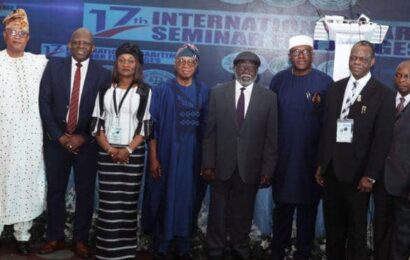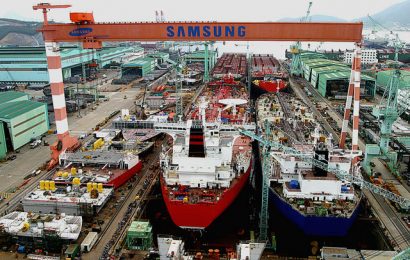

To attain net zero carbon emission for shipping by 2050 in line with the policy of the International Maritime Organization (IMO), the Nigerian Government has rolled out more proactive measures.
Speaking in Lagos on Thursday at the 2022 World Maritime Day celebration with the theme ‘New Technologies for Greener Shipping, Minister of Transportation, ‘ Mu’azu Jaji Sambo, explained that Nigeria is duty bound to contribute to global efforts to ensure a safer environment in all sectors, including shipping.
He explained that Nigeria is committed to the disbursement of the much-awaited Cabotage Vessel Financing Fund (CVFF) to enable ship owners to acquire newer ships with modern technologies that would reduce environmental hazard.
According to him, private sector operators need to commit to investing in more modern platforms and assets that will meet the emission levels of the future.
Sambo said the entire maritime community has a role to play in bringing about a greener and sustainable maritime industry in the areas of resource mobilisation, maritime training, awareness, job creation and full implementation of maritime laws and regulations.

He called on the private sector operators – who are the beneficiaries of policies put in place by government to address carbon emission to support the full implementation and deploy adequate resources and emerging technologies in partnership with the government to address carbon emission.
Listing other strategies, Bashir Jamoh, director general of the Nigerian Maritime Administration and Safety Agency (NIMASA), said Nigeria plans to cut its Greenhouse Gas emissions intensity by 20 percent by 2030 – and a further 45 percent reduction conditional on receiving climate finance, technology transfer and capacity building.
He said Nigeria will adopt a National Action Plan in 2023 that will ensure that the National Technical Committee on reduction of greenhouse gas emissions from ships will be strengthened and tasked to develop a clear and achievable plan.
He said there would be provision of incentives and financial mechanisms to shipping companies, port operators, and others in the maritime value chain to invest in new enterprise and innovative solutions.
“NIMASA will act by mobilising and facilitating fiscal policies and financial mechanisms – including donor initiatives to support energy efficiency and emission reduction initiatives focused on ships, port infrastructure, and other key areas,” he said.
Jamoh said that Nigeria needs global and regional cooperation and partnerships to transition to a net zero carbon emission future in shipping to share good practices and information, create synergies, and leverage expertise.
He added that the Agency will also take steps to ensure ships comply with the IMO 0.5 percent global limit for sulphur in fuel oil used on board ships, delineating emission control and slow steaming areas in Nigeria’s ports.
Mohammed Bello-Koko, managing director of the Nigerian Ports Authority, said the NPA is poised to embrace partnerships, support policies and actions steps aimed at optimising the advantages that the endowment of over a hundred trillion cubic feet of natural gas can bring to bear on Nigeria’s economy.
“Realising that automation is the pillar of port efficiency, we are working assiduously under the technical guidance and consultancy of the IMO to deploy the Port Community System (PCS) which will afford us the platform needed to develop a cocktail of digital solutions that can make ships more energy-efficient, reduce pollution, and ensure the global competitiveness of the Nigerian Ports through eco-friendly services,” he said.
George Moghalu, managing director of the National Inland Waterways Authority, called for the used of barges in cargo evacuation to cut down the volume of carbon emission to the environment considering the fact that barges can move large numbers at a go.
In his submission, the Executive Secretary, Nigeria Shippers Council, Emmanuel Jime said the Nigerian Shippers’ Council is committed to ensuring that the added cost thrown up in the implementation of these new technologies does not increase the cost of doing business at the Nigerian Seaports.
Jime added: “ Ships are crucial to the global economy and over 85% of all the goods and services that enter Nigeria come via the seaports. Considering this, any transition to greener fuels could be expensive, and consumers will most likely be at the receiving end due to the huge technological advancement that is required to adapt to this change. The time has come ever more than before to have concerted, deliberate efforts of all concerned authorities towards adopting measures, not only to implement but also to put in place accompanying measures to cushion the effects of this change. Africa’s maritime sector is bound to be affected by the IMO 2020 targets and one of the key concerns of African states is the availability, quality and supply of low Sulphur fuel and whether refineries would be able to meet new demands.
One of the challenges is that Africa’s maritime sector is still developing and will require resources and capacity-building to strengthen institutions which are responsible for incorporating international conventions into local law, implementing the legislation and policing the environmental legislation.




